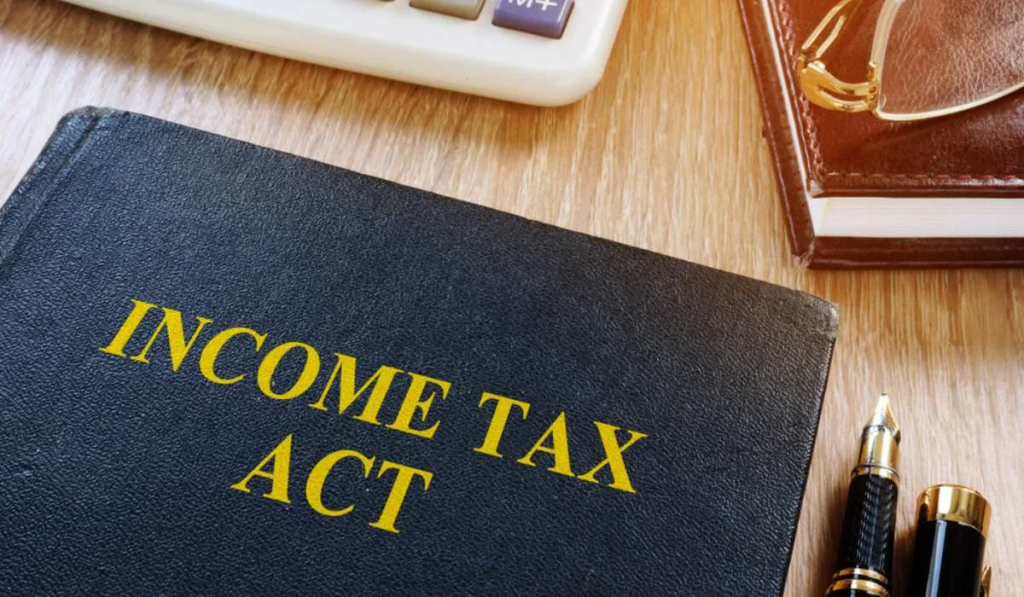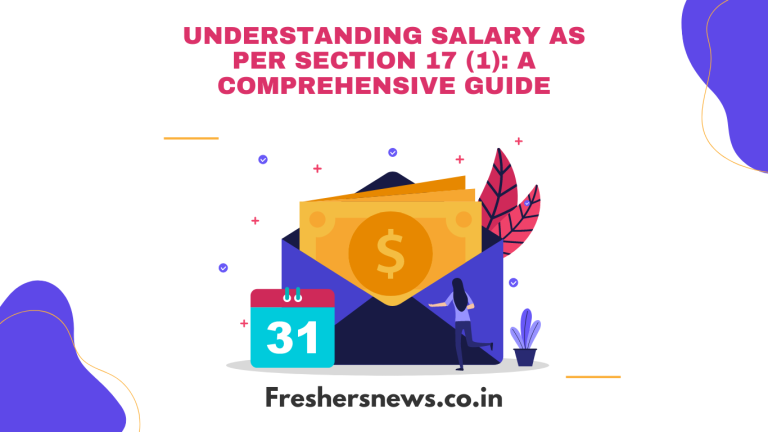In employment, salary holds a central position, impacting the lives of both employers and employees alike. It is the essence of financial stability and is intricately twirled with the complex web of tax regulations. When understanding how salary is calculated and taxed, one must turn to Section 17 (1) of the Income Tax Act—a crucial source of guidance. This section delineates the various components that constitute salary, sheds light on their taxation implications, and reveals the deductions and exemptions available to taxpayers. Understanding Salary as per Section 17 (1).

In this article, we explore the multifaceted nature of salary as per Section 17 (1), peeling back its layers and presenting a comprehensive guide to help individuals navigate the intricate landscape of income taxation. Whether you find yourself in the role of an employer striving for compliance or an employee seeking clarity regarding your salary structure, this article endeavors to arm you with the knowledge needed to make informed decisions and optimize your financial planning. Join us on this enlightening journey as we unravel the nuances of salary as per Section 17 (1) and delve into its profound implications within the realm of taxation.
Understanding Salary as per Section 17 (1) Definition of Salary as per Income Tax Act
Sub-section (1) of Section 17 of the Income Tax Act provides an inclusive definition of “Salary”. It is a much broader term than it is usually understood. In a financial year, the amount received by the employee from his employer in any of the following forms will be considered “Salary” for income tax purposes:
Wages- A sum paid under contract by the employer to the employees for services rendered is called wages. The employee may receive it under various names such as basic pay, salary, remuneration, etc. The payment may be for paid leaves, work, or the amount received or due during the previous year.
Annuity or Pension—An annuity or pension is a payment received from a previous or present employer after attaining retirement. It may be a payout from the pension plans created by the employer.
Annuity received from a present employer is taxed as ‘Salary.’
Annuity received from a previous employer is taxed as ‘Profits instead of Salary.’
Profits instead of Salary or Wages
These payments include:
Employment termination compensation or employment terms modification compensation.
Payment due or received from an unrecognized provident fund or an unrecognized superannuation fund to the extent of the employer’s contribution and interest on the employer’s contribution.
Payments from the key man insurance policy and the sum allocated as a bonus on such policy.
Any amount received from any person before joining or after cessation of the employment is also termed ‘profits instead of salary’.
Gratuity—Gratuity is a lump-sum amount voluntarily paid by the employer to the employee as a token of appreciation for the services rendered to the organization. The concept of gratuity is statutorily recognized under The Payment of Gratuity Act of 1972.
Fees—An amount received as fees from the employer to the employee for the services rendered is included in the definition of salary.
Commission- Any commissions given to the employee for services shall form part of the salary. If the employee receives a fixed commission as a percentage of the sales or profits, it shall be considered salary.
Perquisites– Perquisites are additional benefits received over and above the salary due to the employee’s official position. They may be provided in cash or kind. Examples include club fee payments, interest-free loans, educational expenses, rent-free accommodation or concession in accommodation rent, and insurance premiums paid for employees.
The advance Salary- Payments received in a financial year are advance salary payments before the year they are due. A loan taken by the employer is not an advance salary.
Leave encashment—The government and some private employers compensate employees for accumulated leaves. They can pay during the service period or after retirement or resignation. The payment received for the encashment of leaves unveiled during the service period will form part of the salary.
Employee Provident Fund- Contributions by the employer exceeding 12 percent of salary or the annual interest exceeding the rate notified by the Central Government (FY 2021-22 EPF interest rate is 8.1%) on balance to the credit of an employee’s recognized provident fund.
Transfer PF balance- The taxable portion of the transferred balance from an unrecognized provident fund to a recognized provident fund will be considered salary.
National Pension Scheme (NPS)- A contribution made by the Central Government or any other employer in a financial year in an employee’s account under National Pension Scheme (NPS) will form part of the salary.
Allowed Deductions from Salary Income
Section 16 of the Income Tax Act allows for the following as deductions from salary –
- Employment/professional tax levied by a state government
- Entertainment allowance available to government employees to an extent of ₹5,000 or 20% of their salary, whichever is lower.
- Standard deduction of up to ₹50,000.
Section 17(2)
Section 17 (2) of the Income Tax Act clarifies the terms ‘perquisites’ receivable by an employee from their employer. There are two kinds of perquisites – monetary and non-monetary.
Enlisted are the different employee benefits which are termed as ‘perquisites’ under the Income Tax Act –
- Expenditure provided by the employer for employees’ travel
- Value of rent-free accommodation provided by an employer
- Value of concessional rent provided by an employer
- Employer’s contribution to the provident fund
- Value of Gratuity
- Superannuation benefits provided by the employer
- Employer’s contribution to deposit-linked insurance schemes
- Insurance premiums paid by the employer for the employee
- Value of any benefit provided at a concessional rate by the employer
- The value of sweat equity shares or any other security transferred by an employer to their employee for free or at a concessional rate
- Value of free domestic help provided by the employer at the employee’s residence
- Free water, gas, electricity, or internet connection provided by the employer
- Value of food coupons
- Free or reimbursement of educational facilities for the employees’ children worth more than ₹1,000
- Any other expense that the employer bears in place of the employee.
Perquisites also include the value of any other benefit provided to the following by the employer for free or at a concessional rate –
- To a director of the company
- To an employee who maintains a substantial interest in the company
Perquisites Exempt From Tax Treatment
The following perquisites are exempted from tax; that is, they attract no tax –
- Telephone expenses are borne by the employer for the employee
- Concessional or free loans provided by the employer for medical treatment of a disease specified in rule 3 A of the Income Tax Act or if the loan amount is not more than ₹20,000
- The rent-free official residence provided to a Judge of a High Court or the Supreme Court or a Union Minister, Parliament Official, or the Leader of the Opposition in the Parliament
- The government of India permits prerequisites to be delivered to a city outside India for rendering services outside the country’s geographical boundaries.
Section 17 (3)
This provision of Section 17 defines the ‘profits instead of salary.’ These profits refer to all the additional benefits an employer provides instead of paying them as the basic salary. These are generally paid out in monetary form, and it is often difficult to differentiate between these and those employee benefits. Thus, the following list of benefits that qualify as ‘profits instead of salary’ comes in useful –
- The compensation received by an employee from an employer at the time of termination of their employment contract or due to modifications in the terms of employment.
- Amount of money payable before beginning or after the termination of employment
- Payments made under the Keyman Insurance Policy
- Employer contributions made towards unrecognized superannuation or provident fund
- Any amount paid by the employer voluntarily
- Payments made by the employer under a legal obligation

Basis of Charge on the Salary
Section 15 of the Income Tax Act deals with the basis of charge. Salary shall be taxable either on a due basis or ‘receipt basis, whichever is earlier. For further clarification, income from salary during the year shall consist of the following:
- Any amount paid in advance to the employee before it became due or payable.
- Whether paid or not, any salary is due to the employee during the year.
- Arrears of salary paid to the employee during the year and not charged to tax in any earlier years.
Place of Accrual of Salary
Salary accrues in India and is taxable under the head ‘Salaries’ if-
- The services are rendered in India even if the payment is made outside India,
- Salary paid by the Government of the foreign country to their employees serving in India,
- Leave salary paid to the employees outside India regarding leaves earned in India shall be deemed to accrue or arise in India and taxed under the head ‘Salary.’
Employment vs. Agency
As mentioned before, with employment, the payee and the payer have an employee-employer relationship. The income that is earned under this relationship is recognized as ‘Salary.’ Alternatively, the relationship under agency is that of an agent and a principal. Moreover, an agent’s income is known as ‘Business Profits’.
An employee is supervised and controlled by an employer. The employee must follow the employer’s instructions. On the other hand, an agent can choose to finish a task or achieve a target according to his style and understanding of working.
Forgoing vs. Surrendering Salary
There can be events where an employee decides to forgo his/her salary, i.e., the employer does not have to give him/her any salary.
In such an instance, the salary will be considered accrued by the employee. Therefore, the salary will be taxed even when the employee does not receive any income. Nevertheless, if the employee wants to surrender his/her salary to the Central Government, the salary rendered will be exempt from the tax deduction.
FAQs
What does Section 17 (1) of the Income Tax Act mean?
Section 17 (1) of the Income Tax Act identifies numerous salary components and their tax consequences. It also outlines how salaries are computed and taxed.
What are salary components as per Section 17 (1)?
Section 17 (1) includes components such as basic salary, allowances, perquisites, profits instead of salary, and any other payments received by an employee in connection with their employment.
Are all components of salary taxable?
Yes, in most cases, all salary components as per Section 17 (1) are subject to taxation. However, certain exemptions and deductions may apply to specific components, reducing the taxable amount.
What is the difference between forgoing and surrendering salary?
Forgoing salary refers to the employee voluntarily giving up their entitlement to receive salary, while surrendering salary involves redirecting the salary to a specific entity, such as the Central Government, for a cause or national development.
Is salary that has been forgone still taxable?
Even if an employee forgoes their salary, it is considered accrued income and is subject to taxation. The employee is still liable to pay taxes on the forgone amount.
Are there any tax benefits for surrendering salary?
Usually, salary surrendered to the Central Government or a designated authority is exempt from tax deduction. This exemption serves as an incentive to encourage contributions towards national causes or initiatives.
Can employers structure salary components to optimize tax benefits for employees?
Yes, employers can structure salary components within the Section 17 (1) framework to maximize employee tax benefits. By understanding the tax implications, employers can design salary packages that minimize the tax burden on employees.
Conclusion
Throughout this article, we have explored the various components of salary and their implications for tax purposes. We have also delved into the concepts of forgoing and surrendering salary, highlighting their distinctions and the corresponding tax considerations.
By grasping the nuances of salary as per Section 17 (1), individuals can ensure compliance with tax regulations and effectively manage their financial resources. Employers can structure salary components to maximize employee tax benefits, while employees can make informed choices regarding the surrendering or forgoing of salary.
In conclusion, the knowledge shared in this article serves as a valuable guide to demystifying salary complexities as per Section 17 (1) and its significance within taxation. By leveraging this understanding, individuals can confidently navigate the intricate landscape of income taxation, optimize their financial well-being, and contribute meaningfully to national causes or initiatives. Let this knowledge empower you to make informed decisions and embark on a path of financial success.



